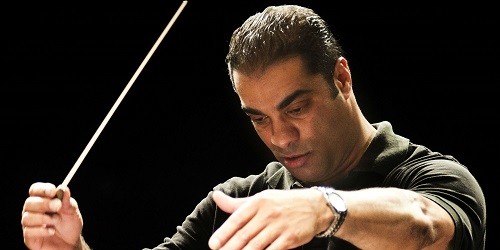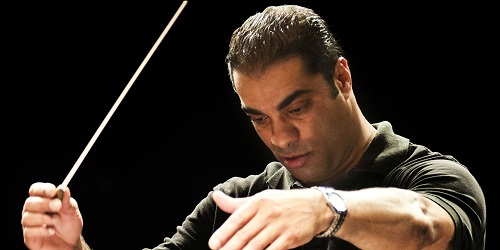 Switzerland Smetana, Hussein & Bartók: Symphony Orchestra of India, Zakir Hussain (tabla) Zane Dalal (conductor), Tonhalle Zurich 19.1.16. (JR)
Switzerland Smetana, Hussein & Bartók: Symphony Orchestra of India, Zakir Hussain (tabla) Zane Dalal (conductor), Tonhalle Zurich 19.1.16. (JR)

Smetana, Overture, Bartered Bride
Hussain, “Peshkar” concerto for tabla and orchestra
Bartók, Concerto for orchestra
This was always going to be an unusual concert, and so it proved.
The Symphony Orchestra of India appears currently to be India’s only professional orchestra dedicated to Western music; it was formed ten years ago, and is based in Mumbai. Concerts take place there in the modern National Centre for Performing Arts. Swiss retail giant Migros (Migros-Kulturprozent-Classics to give its arts arm its exact title) has helped to finance their tour to Swiss cities, taking in St. Gallen, Berne, Zurich and Geneva.
The first thing you cannot help noticing is, sadly, how few Indian faces are amongst the players. I didn’t count them but it’s a handful and, strangely, most of them play the viola. The violinists appeared to be chiefly Asian women, other instruments were – I was told – often played by Eastern Europeans. I could not verify that as, unhelpfully, there was no list of the orchestra’s members in the programme.
The curtain-raiser was Smetana’s Overture to his opera The Bartered Bride which fizzed along at break-neck speed and proved a crowd pleaser.
Then came Hussain’s concerto for “tabla.” The Orchestra Manager and an assistant manoeuvred a large table to front stage, on which Hussain sat, cross-legged with his bottle of water and supply of talcum powder, behind his two “tablas”, a sort of Indian bongo drum. You will have heard the sound as muzak in many a provincial curry restaurant or as the background to the numerous TV programmes about decrepit but charming mountain railways in Darjeeling; the sound is instantly recognisable and evocative. Hussain appears to have garnered near-Godlike status in India; he is by all accounts the top of the tree as far as tabla players are concerned. The many Indians in the audience whooped with delight when he first appeared. Hussain once met Beatle George Harrison, has played with Ravi Shankar, and – now living in California – has provided part of the soundtrack for several well-known films (such as Apocalypse Now! and Little Buddha). His virtuosity on the tabla is breath-taking (I cannot imagine anyone playing these drums any faster or better), though there is to my ears a limit to the sounds and sort of sounds these drums can make. I would be intrigued to see the notation – of course Hussain plays without a score and there is a fair amount of extemporisation.
As no-one appears to have written a concerto for the instrument, Hussain has written one himself, and there’s the rub. He’s undoubtedly a brilliant player of his instrument but less than a brilliant composer. His half-hour work is reminiscent of Copland and Adams, unsurprisingly given his current residence, and of film music. It often overpowered his instrument, even though the drums were amplified. The concerto was too long by some 15 minutes. An Indian lady near me, who was ecstatic at Hussain’s first appearance, promptly fell asleep during most of the performance. It had that sort of hypnotic effect. There was no chanting and Hussain was not in a trance, but it would have helped us all. Enough said.
The Bartók Concerto proved a mite too ambitious for this orchestra; it just wasn’t in their blood. The tall, young Indian Chief Guest conductor Zane Dalal (who grew up in London and studied organ at Oxford) had to spend most of his time simply counting the beat, but there were too many raw edges and early entries for comfort. The woodwind in the Dance of the Couples lacked colour. The work is splendid and the performance therefore could be enjoyed, even though the orchestra was stretched. Fast tempi helped to blur some detail.
The test of this orchestra will be whether, in ten to twenty years’ time, more Indian faces will be seen on stage and whether the Western programmes they play in India draw local audiences in sufficient numbers. They already attract top soloists, Sitkovetsky, Kovacevich and Gawrilow to name just a few. Conductors have included Dutoit, Vásáry, Simonov, Payare and Damev (current Director of Migros-Kulturprozent). I do hope the orchestra succeeds.
John Rhodes

If you didn’t have an orchestra list how can you judge the orchestra’s race? Even if you had had a list how could you judge a race by their names? And why should it matter anyway, there are plenty of international orchestras with people of all races…